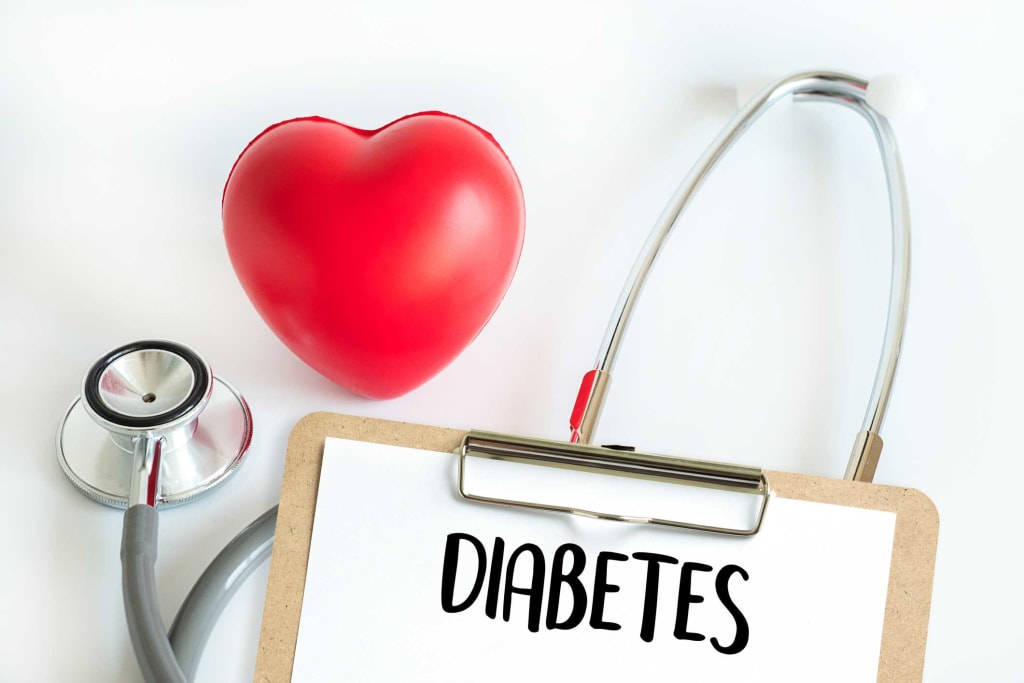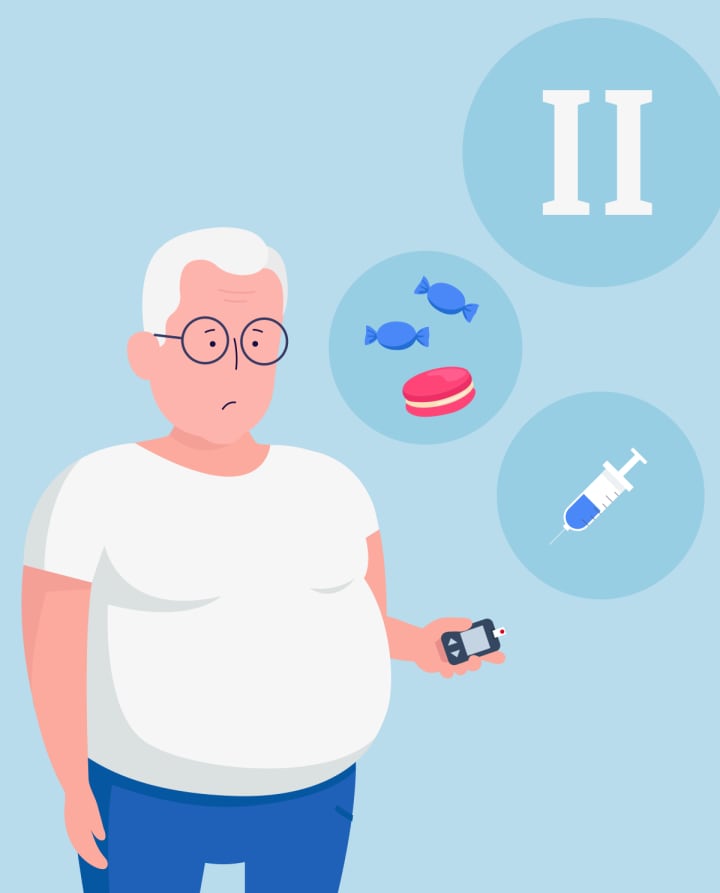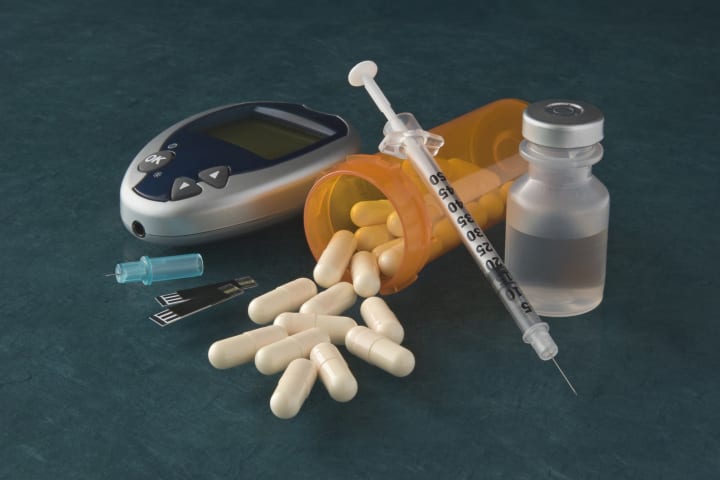
Diabetes is caused by the body's inability to produce enough insulin or to utilise it appropriately. Insulin is a hormone that helps regulate blood glucose levels, and if there isn't enough of it operating properly, health problems might arise. Different causes, such as genetics or lifestyle decisions, can cause different forms of diabetes.
Diabetes is a condition in which a person's blood glucose, or blood sugar, levels cannot be controlled. Insulin is a hormone produced by the pancreas that permits cells to absorb glucose from the blood. This permits the body to utilise glucose for energy while maintaining a healthy blood sugar level.
Many conditions, however, might cause the pancreas to produce insufficient insulin or cells to be unable to utilise insulin adequately. This can result in an excess of glucose in the blood, which can contribute to the development of diabetes.
Different forms of diabetes can manifest itself in a variety of ways, as discussed in this article.
Diabetes definition
Diabetes is a condition in which insulin fails to manage blood sugar levels adequately. According to the American Diabetes Association (ADA), more than 34 million Americans have diabetes in 2018, with over 7 million cases remaining undiagnosed.
Diabetes appears to be the sixth largest cause of death in the United States, according to evidence. However, because death certificates may not always list diabetes as a cause of death, the true number of deaths is likely higher. Diabetes increases the risk of numerous major complications, including heart disease, stroke, and kidney disease, in addition to different symptoms such as weariness, eye issues, and increased thirst and urination.
Types and causes of diabetes
Diabetes is a disease that produces complications. Trusted The body's utilization or production of insulin is a source of information. Food is broken down by the body into glucose, which is then released into the bloodstream. Glucose is an energy source that the body either absorbs or stores for later use. Insulin is a hormone that directs glucose into cells or into muscle and liver tissues for storage.
Depending on how much glucose is in the bloodstream, the pancreas generally releases enough insulin. Insulin, on the other hand, is unable to appropriately regulate glucose in diabetics. This allows glucose to remain in the bloodstream for an extended period of time, posing a health risk to the body.
The kind of diabetes determines why insulin is unable to manage glucose appropriately. The following are the most typical categories of trusted sources:
- Prediabetes : Prediabetes, often known as borderline diabetes, develops before type 2 diabetes. Blood sugar, blood pressure, and insulin resistance may have reached dangerous levels by this point.
- Type 1 diabetes : Because the immune system incorrectly targets insulin-producing cells in the pancreas, the body is unable to create adequate insulin. It is unknown what causes type 1 diabetes to develop, however genetic and environmental factors may play a role.
- Type 2 diabetes : The body does not use insulin efficiently enough to keep blood sugar levels in check. Some tissues, for example, become insulin resistant and need more insulin. Type 2 diabetes can be caused by a variety of causes, including heredity, obesity, and lack of physical activity.
- Gestational diabetes : Pregnancy can trigger hormonal changes that contribute to insulin resistance, which can lead to gestational diabetes. Gestational diabetes can be caused by a combination of genetic and lifestyle factors.
There are also a number of less frequent kinds of diabetes, each with its own set of symptoms and causes, such as:
- Maturity-onset diabetes of the young (MODY) : A group of diseases in which a person's ability to make insulin is hampered by inherited genetic abnormalities. They usually appear during adolescence and early adulthood.
- Latent autoimmune diabetes of adults (LADA) : A kind of diabetes in which the immune system disrupts insulin's ability to regulate blood sugar levels. Although the condition proceeds more slowly than type 1 diabetes, most people will switch from oral to insulin treatment within six months of being diagnosed.
- Neonatal diabetes : A kind of diabetes that affects babies under the age of six months and causes the pancreas to produce insufficient insulin.
- Wolfram syndrome : A hereditary disorder that can lead to diabetes as well as visual and hearing issues.
- Alström syndrome : Another uncommon genetic condition that can lead to type 2 diabetes, as well as obesity, eyesight or hearing loss, and renal failure.
- Steroid-induced diabetes : Steroids are synthetic hormones that cause the liver to produce more glucose, causing blood sugar levels to rise. Insulin resistance can arise as a result of this.
- Cystic fibrosis diabetes : A hereditary disorder in which mucus builds up in the pancreas, causing injury and high blood sugar.
- Type 3c diabetes : It's also known as pancreaticogenic diabetes, and it happens when the pancreas stops generating insulin due to disease, damage, or surgery.
Risk factors

Risk factors for diabetes, according to the Centers for Disease Control and Prevention (CDC), include:
- genetics and family history
- age, which includes younger ages for type 1 diabetes or older ages for type 2
- overweight and obesity
- physical inactivity
- an unhealthy diet
- hormone disorders, such as polycystic ovary syndrome
- certain ethnic backgrounds, such as African American or Hispanic American
- having certain diseases, such as non-alcoholic fatty liver disease
- previously having gestational diabetes
- giving birth to a baby over 9 pounds
Symptoms
Symptoms of diabetes vary depending on the kind and cause, but they may include:
- fatigue
- eyesight problems
- increased urination and thirst
- hunger
- tingling sensations in the hands and feet
- recurring sores
- weight loss that was unexpected
Without treatment, diabetes can lead to major health consequences such as heart disease or stroke.
Treatments
DIABETES SOLUTION KIT(watch the below link video)

There are no cures for diabetes at this time. However, depending on the sort of treatment, there are a variety of options. The goal of treatment is to keep blood glucose levels in a healthy range so that symptoms and consequences can be managed.
Diabetes can be treated in a variety of ways, including:
- Prediabetes : Prediabetes can be prevented from progressing to type 2 diabetes by losing weight and increasing physical activity.
- Type 1 diabetes : Blood sugar control necessitates daily insulin dosages. These can be administered via a syringe, an insulin pen, or a pump.
- Type 2 diabetes : Changes in lifestyle, such as a healthier diet or more physical activity, may be required. Many people will need oral drugs and, in the future, insulin. Weight loss surgery may be a possibility in some circumstances.
- Gestational diabetes : Dietary adjustments, for example, can assist to lower blood sugar levels. If lifestyle adjustments aren't working, doctors may prescribe diabetes medications.
Is it reversible?
Diabetes may be reversible in some cases. People with prediabetes, for example, can prevent type 2 diabetes and lower their blood sugar levels by decreasing weight and exercising consistently.
Type 2 diabetic patients can achieve remission. This occurs when blood sugar levels remain within a normal range for at least six months without the need of drugs. It can be accomplished by adopting a healthier lifestyle.
Other types of diabetes, on the other hand, are irreversible. Type 1 diabetes, for example, is an autoimmune disease that requires daily insulin injections for the rest of one's life.
When to see a doctor
Diabetes is a serious illness that necessitates medical treatment. Anyone who is having diabetic symptoms or signs should seek medical advice and treatment. For the following symptoms, the CDC suggests consulting a doctor for a blood test:
- frequent urination, even at night
- frequent thirst and hunger
- weight loss that isn't predicted
- fuzzy eyesight
- tingling or numbness in the hands or feet
- constant weariness
- extremely dry skin
- frequent infections
Summary
Diabetes creates high blood sugar levels as a result of insulin issues. The body either produces insufficient insulin or uses it inefficiently. Insulin issues can be caused by a variety of factors, ranging from genetics to lifestyle choices.
Prediabetes is one type of diabetes that can be reversed with lifestyle modifications and therapy. Other varieties of diabetes, such as type 1 diabetes, do not have a cure at this time. Regular insulin administration, on the other hand, can help manage symptoms and lower the risk of complications.
About the Creator
SL-Modi.P
Life is short, so always find about new things & always be happy!






Comments
There are no comments for this story
Be the first to respond and start the conversation.